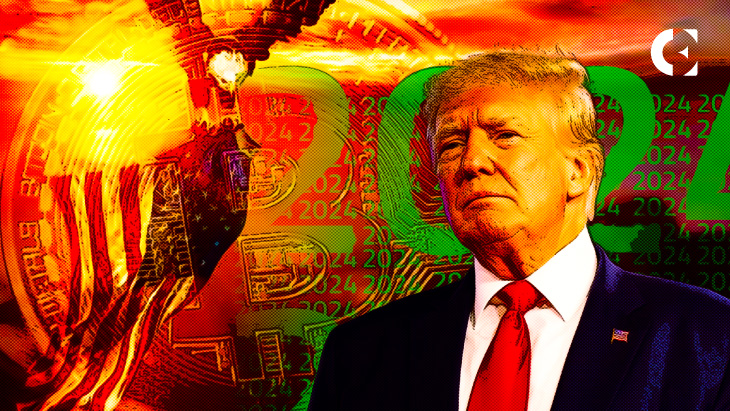- Crypto industry backs Trump’s 2024 run, seeking regulatory reforms to boost innovation amid SEC’s strict enforcement under Gensler.
- Trump’s pivot to a pro-crypto agenda, including World Liberty Financial, contrasts with stricter measures under the Biden administration.
- November 2024 elections will shape the US crypto sector, with contrasting policies from Trump and Harris impacting future regulations.
The crypto industry actively backs the 2024 US elections, hoping for a Donald Trump victory. This support stems from his campaign’s promise of a pro-crypto agenda. Meanwhile, regulatory scrutiny continues under the Securities and Exchange Commission (SEC), led by Gary Gensler. He asserts that the sector is full of scams, as crypto firms allegedly violate established financial laws. Political donations from crypto players have surged, aiming to shape laws in their favor.
Crypto Sector’s Political Ambitions
The upcoming November elections are pivotal for the crypto sector. In addition to the presidential race between Trump and Kamala Harris, all 435 House seats and 33 Senate seats are contested. The industry believes that a win by Trump could yield policies that boost cryptocurrency innovation. Trump recently launched World Liberty Financial, a venture he claims will advance crypto in America. He also envisions a national bitcoin stockpile to mirror the gold reserves.
Read also: Crypto’s Political Spending Spree: Free Speech or “Monstrous” Influence?
Shifting Stance on Cryptocurrency
Trump’s current support for crypto marks a shift from his earlier skepticism. In 2021, he labeled Bitcoin a scam and a threat to the dollar. Now, he aims to make the US the “crypto capital of the planet.” In contrast, the Biden administration has enforced stricter regulations, which has led to several enforcement actions against major firms, including Binance and FTX.
Ongoing Regulatory Pressure
Under Gensler, the SEC has increased its actions against non-compliant crypto firms, citing investor protection concerns. Last year, the SEC filed 46 enforcement actions in the crypto space. Binance founder Changpeng Zhao was recently convicted and fined billions, while FTX’s Sam Bankman-Fried received a 25-year sentence for fraud.
Declining Public Interest
A recent Federal Reserve survey highlighted a decline in US crypto usage, dropping from 12% in 2021 to 7% in 2023. While some believe crypto offers fast, secure transactions, others consider it risky.
Harris’ Position on Emerging Tech
Kamala Harris has not been vocal about crypto, though her advisers suggest she supports growth-friendly policies for emerging technologies. However, her campaign appears more focused on regulatory oversight than Trump’s proposed innovations.
Read also: Harris’s Crypto Push Drives Bitcoin Rally to $66K, Outpacing Traditional Assets
SEC’s Stance on Investor Protection
Gensler emphasizes that securities laws aim to protect investors, requiring firms to share critical financial information. The SEC views crypto as a potential threat to market integrity despite its smaller scale than traditional financial markets. While crypto advocates push for reforms, the SEC remains firm on compliance.
The outcome of the 2024 elections could notably influence the future of the US crypto sector. With both candidates adopting contrasting stances, the results are set to impact the industry’s regulatory landscape.
Disclaimer: The information presented in this article is for informational and educational purposes only. The article does not constitute financial advice or advice of any kind. Coin Edition is not responsible for any losses incurred as a result of the utilization of content, products, or services mentioned. Readers are advised to exercise caution before taking any action related to the company.







